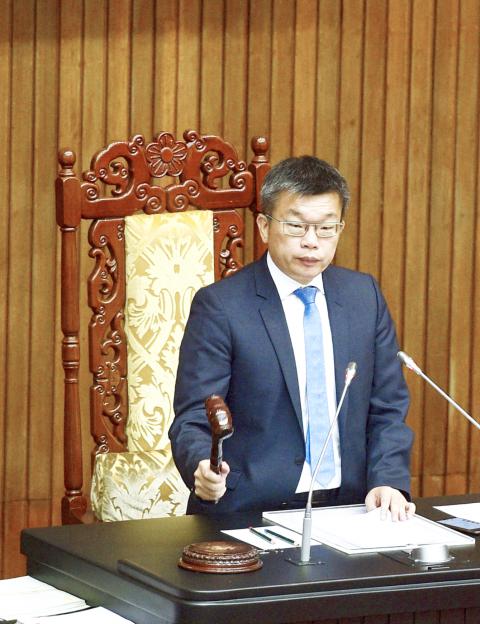Lawmakers yesterday passed the Special Act on the Procurement of Updated Fighter Jets (新式戰機採購特別條例), which caps the budget for the purchase of 66 F-16Vs at NT$250 billion (US$8.19 billion).
The act aims to respond to enemy threats and urgent national defense needs by gradually acquiring updated high-performance jets, to strengthen the air force’s combat abilities, improve the nation’s preparedness for joint operations, and ensure national and regional security, the act states.
It also seeks to enable the nation to attain autonomy regarding defense and drive domestic economic growth, it says.

Photo: Peter Lo, Taipei Times
The procurement plan covers the acquisition of the jets and their equipment, as well as the acquisition, maintenance, development and manufacture of ancillary systems, the act says.
The cost is to be covered by a special budget of up to NT$250 billion, which would come from loans and surplus revenue from the previous fiscal year, it says.
The budget may be tapped to cover the central government’s running expenses, the act says.
If the expenditure exceeds the approved budget due to currency fluctuations, an item should be proposed in the general budget to cover the shortfall, it says.
The act has a Dec. 31, 2026, deadline.
Also passed were supplementary resolutions sponsored by the Chinese Nationalist Party (KMT), the New Power Party (NPP) and the People First Party (PFP).
The KMT’s motion says that as the National Defense Industry Development Act (國防產業發展條例) was passed in June, the Ministry of National Defense should ask the US to transfer technologies used to make F-16V parts and components, and lobby for US approval to allow Taiwan to manufacture key F-16V components.
The nation should also establish an “F-16 Asian maintenance center” after the jets have been delivered, it says.
The NPP’s motion says the ministry should report annually to the legislature’s Foreign Affairs and National Defense Committee about the delivery progress of the jets, technological collaborations with the US and logistics to receive the jets.
The PFP’s motion says the government should ask the foreign manufacturer of the jets — Lockheed Martin Corp — to invest in industrial collaborations with Taiwan, including component manufacturing, technological transfers and industrial upgrade initiatives.
The defense ministry and the Ministry of Economic Affairs should work together to secure private-sector resources for the national defense industry, the motion says.
The F-16Vs are expected to be deployed at Chihhang Air Base (志航空軍基地) in Taitung County, while the air force plans to set up a combat squad of up to 1,000 personnel, military sources said.
Minister of National Defense Yen De-fa (嚴德發) said that the nation should receive the first batch of F-16Vs in 2023 and all 66 jets before the end of 2026.
Additional reporting by CNA

DAREDEVIL: Honnold said it had always been a dream of his to climb Taipei 101, while a Netflix producer said the skyscraper was ‘a real icon of this country’ US climber Alex Honnold yesterday took on Taiwan’s tallest building, becoming the first person to scale Taipei 101 without a rope, harness or safety net. Hundreds of spectators gathered at the base of the 101-story skyscraper to watch Honnold, 40, embark on his daredevil feat, which was also broadcast live on Netflix. Dressed in a red T-shirt and yellow custom-made climbing shoes, Honnold swiftly moved up the southeast face of the glass and steel building. At one point, he stepped onto a platform midway up to wave down at fans and onlookers who were taking photos. People watching from inside

A Vietnamese migrant worker yesterday won NT$12 million (US$379,627) on a Lunar New Year scratch card in Kaohsiung as part of Taiwan Lottery Co’s (台灣彩券) “NT$12 Million Grand Fortune” (1200萬大吉利) game. The man was the first top-prize winner of the new game launched on Jan. 6 to mark the Lunar New Year. Three Vietnamese migrant workers visited a Taiwan Lottery shop on Xinyue Street in Kaohsiung’s Gangshan District (崗山), a store representative said. The player bought multiple tickets and, after winning nothing, held the final lottery ticket in one hand and rubbed the store’s statue of the Maitreya Buddha’s belly with the other,

‘NATO-PLUS’: ‘Our strategic partners in the Indo-Pacific are facing increasing aggression by the Chinese Communist Party,’ US Representative Rob Wittman said The US House of Representatives on Monday released its version of the Consolidated Appropriations Act, which includes US$1.15 billion to support security cooperation with Taiwan. The omnibus act, covering US$1.2 trillion of spending, allocates US$1 billion for the Taiwan Security Cooperation Initiative, as well as US$150 million for the replacement of defense articles and reimbursement of defense services provided to Taiwan. The fund allocations were based on the US National Defense Authorization Act for fiscal 2026 that was passed by the US Congress last month and authorized up to US$1 billion to the US Defense Security Cooperation Agency in support of the

HIGH-TECH DEAL: Chipmakers that expand in the US would be able to import up to 2.5 times their new capacity with no extra tariffs during an approved construction period Taiwan aims to build a “democratic” high-tech supply chain with the US and form a strategic artificial intelligence (AI) partnership under the new tariffs deal it sealed with Washington last week, Taipei’s top negotiator in the talks said yesterday. US President Donald Trump has pushed Taiwan, a major producer of semiconductors which runs a large trade surplus with the US, to invest more in the US, specifically in chips that power AI. Under the terms of the long-negotiated deal, chipmakers such as Taiwan Semiconductor Manufacturing Co (TSMC, 台積電) that expand US production would incur a lower tariff on semiconductors or related manufacturing